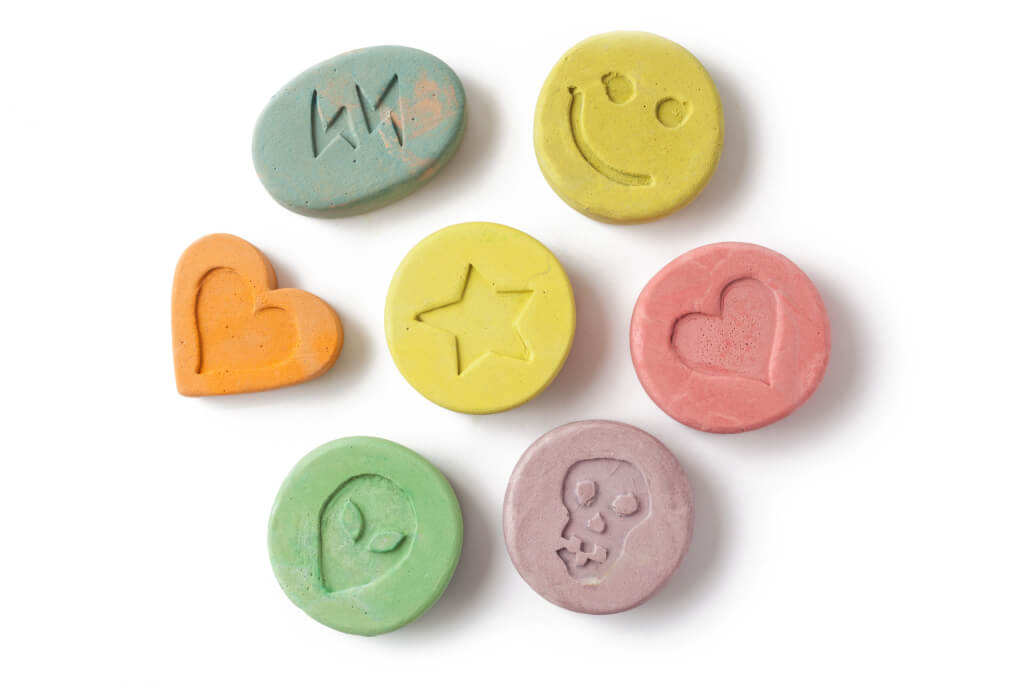Many people are familiar with street drugs such as cocaine, crack, and heroin. They have a basic understanding of the dangerous effects of using them and that they often prove addictive. A popular street drug known by a variety of names, including ecstasy, ‘E’, Molly, and MDMA, remains more mysterious to many people. When someone develops a habit of taking ecstasy, they may wonder about any potential harm associated with it. In particular, this question comes up: Is ecstasy addictive?
The Origins of Ecstasy
The drug ecstasy was developed in a German laboratory in 1912. Officially known as Methylsafrylaminc, it was originally created to assist with other medications to help control bleeding. It wasn’t until the late 1970s that ecstasy became popular among a small group of psychiatrists. They found that the use of the drug by their patients could assist them in better understanding their issues, as well as communicating more openly.
During this window of time, the drug enjoyed a rise in popularity as a street drug. Many users reported that they experienced a high similar to that of LSD. They enjoyed benefits ranging from enhanced enjoyment of music and dancing to feeling they had mind-opening thoughts and experiences.
In 1985, the Drug Enforcement Administration (DEA) announced an emergency ban on ecstasy. The drug had not previously received approval from the U.S. Food and Drug Administration (FDA). The DEA defined MDMA as a substance with no currently accepted medical use, as well as one with a high potential for abuse. It is classified as a Schedule I drug. The DEA’s concern about abuse suggests that ecstasy is addictive.
A Concerning Number of Young Students Report Having Used Ecstasy
The National Institute on Drug Abuse (NIDA) presented the findings of a study from 2020 that examined the usage of ecstasy in school-age children. The report indicated that the following amount of usage of ecstasy occurred within specified age groups:
- 3.6% of 12th-graders
- 2.6% of 10th-graders
- 1.7% of 8th-graders
In 2018, another study by the NIDA reported that 10.5% of people aged 18-25 and 7.5% of people 26 and older had used MDMA.
Can You Overdose on Ecstasy?
A common companion question to wondering is ecstasy addictive is whether or not one can overdose on it. While overdoses of ecstasy are not as common as those associated with drugs such as cocaine and heroin, the risk of overdose remains a threat.
One result of engaging in ecstasy use can be the inability to recognize physical symptoms that are potentially dangerous. For example, a lot of people cite the ability to dance for longer periods of time at parties and other social events as a benefit of ecstasy’s usage. They often fail to realize that their bodies are experiencing unhealthy symptoms. They may become dehydrated and unable to sweat, which causes physical distress.
Symptoms that can occur from overdosing on ecstasy include:
- High blood pressure
- Feeling faint
- High body temperature
- Losing consciousness
- Seizures
- Panic attacks
- Hypothermia
- Inability to sweat
- Dehydration
- Kidney system failure
- Cardiovascular system failure
While the risk of overdosing on ecstasy is not as high as with drugs such as cocaine or heroin, the risk exists. Many ecstasy users combine this drug with others, such as alcohol and stimulants. When this happens, the cause of an overdose can be difficult to isolate when they first arrive at the E.R.
Is Ecstasy Addictive?
NIDA reports that a large potential for developing an addiction accompanies the usage of ecstasy. With over 40% of people who use ecstasy meeting the diagnostic criteria for drug addiction, its usage earns its reputation for being a dangerous drug. This statistic does include those who also abuse other illegal or prescription drugs, along with ecstasy.
Like other narcotics that lead to substance use disorder, ecstasy users often develop a tolerance for the drug. They find they need to increase the dosage in order to achieve previous levels of feeling high. This, in turn, leads to more of a risk of developing an addiction. It also increases the chances of ending up overdosing.
Unfortunately, many people experience being lulled into believing that a party drug like ecstasy feels harmless. They then apply that same misconception to other drugs, which creates a multiple-choice cornucopia of drugs that they use. This can foster addiction to multiple substances.
Even when a person who uses ecstasy doesn’t report experiencing typical physical harm, they may have developed a psychological dependence on the drug. This can cause disruption in a person’s life. They may lose focus on important things in their lives, such as schooling, career, and relationships. The pursuit of procuring ecstasy for regular usage usurps their usual goals. Whatever level of addiction presents itself, seeking professional treatment can help the person wean off the drug and reset their lives.
Ecstasy Detox Services in California
Are you concerned about the usage of ecstasy by yourself or a loved one? MD Home Detox provides a helpful detoxification program that addresses the usage of multiple types of drugs and alcohol. Our experienced professionals work with you in the comfort of your own home to help you complete the detox process. We provide a licensed nurse 24/7, as well as supervision by a doctor.
If staying home to complete your detox and benefiting from keeping your personal life private appeals to you, contact MD Home Detox for more information. Call them now at (888) 592-8541 or click here to email them.

